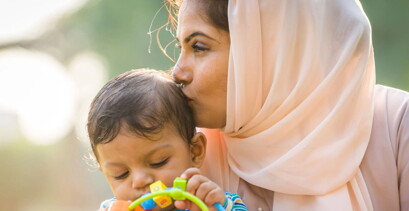Toddler Eye Care & Vision
Discover every detail about your toddler's vision. Learn more about warning signs you need to pay attention to in order to prevent future issues. Click here.
How good is a toddler's vision?
Between the ages of 1 and 2 years, your toddler's vision is rapidly developing. Most 2-year-olds can see at the 20/60 level.
Your child's visual acuity will continue to develop until it reaches the adult visual acuity level of 20/20 sometime between the ages of 7 and 9 years.
What does 20/60 vision mean? Is this normal vision?
It may help to first understand how doctors measure visual acuity. Through testing many people, eye doctors have determined what a normal human should be able to see when standing 20 feet away from an eye chart. For adults, 20/20 vision is considered normal. (In metric terms, the standard is 6 meters, and it's called 6/6 vision.)
If a child has 20/60 vision, it means that when he stands 20 feet away from the chart, he can only see what a normal adult can see when standing 60 feet from the chart.
This does not mean that your child has a vision problem. It simply means that his eyes have not yet developed completely to the point where his vision is as good as a normal adult's vision.
When does my toddler need to have his eyes examined?
Your child's vision should be checked every time he goes for a routine checkup.
During these screenings, your doctor will evaluate eye health, check for any evidence of eye disease, and make sure that both eyes are working together.
If these checks indicate that your toddler's vision is developing normally, he will not need more formal testing until he is 3 or 4 years old.
If your family has a history of serious vision problems, your health care professional may refer you to an eye specialist.
What are some warning signs that my child might have a vision problem?
Signs that your child is having trouble seeing or that his eyes are not normal include
- Redness, swelling, crusting, or discharge in his eyes or eyelids that lasts for more than 24 hours
- Excessive tearing
- Sensitivity to light
- Eyes that look crooked or crossed
- Eyes that don't move together
- Holding the head in a tilted or other abnormal position
- Frequent squinting
- Drooping eyelids
- Frequent eye-rubbing
If your child shows any of these signs, you should talk to your child's doctor.





